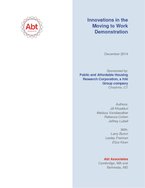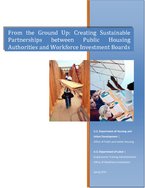Found 5 resources.
0
0
0

Since federal public housing assistance was first created in 1939 amid the Great Depression, public housing advocates have struggled with how to move low-income families to higher-opportunity neighborhoods, typically defined as neighborhoods with less poverty (though experts argue there are other ways to measure opportunity, including quality of schools and access to public transportation, and KCHA uses a broader “opportunity index” to compare locations). The Moving to Opportunity program, a federal demonstration in the 1990s, documented outcomes of families moving to neighborhoods with lower...
Topics: Child welfare, CLPHA, Early childhood, Education, Mobility, MTW, Pacific Northwest, Partnerships
0
0
0
For fiscal year 2013, the Department requests $2.07 billion for the Public Housing Capital Fund to address development, rehabilitation, modernization and preservation needs of the Public Housing portfolio. While funding the Capital Fund at the requested level of $195 million over the fiscal year 2012 appropriation will not enable PHAs to meet all existing capital and accrual needs for fiscal year 2013, funding at this level will provide PHAs with some ability to prevent their housing stock from falling into a state of obsolescence, disrepair, and/or removal from inventory.
Topics: Funding, Green, Legislation & Policy, MTW, Sustainability
 Shared by Housing Is
on Jul 27, 2018
Shared by Housing Is
on Jul 27, 2018 0
0
0
This report catalogues and describes the MTW innovations that participating PHAs and the study team consider most important and far-reaching in their effect on residents, the agency, and the local community. The report is largely descriptive and does not attempt to measure the results of the innovations undertaken by MTW PHAs. However, it does classify the innovations, discuss their significance, and explain how they make use of the flexibility afforded by MTW.
Topics: Cost effectiveness, Funding, Housing, Mobility, MTW
 Shared by Housing Is
on Jul 20, 2018
Shared by Housing Is
on Jul 20, 2018 0
0
0
Assisting public housing residents on the path towards self-sufficiency requires going beyond providing decent, safe, and affordable housing. Public housing residents may face barriers to employment, such as limited education, job skills and/or proficiency in the English language. This toolkit is a resource for both frontline staff and management. It offers examples of how partnerships between DOL and HUD can increase public housing resident employment and create mutual benefit for both agencies.
Topics: Criminal justice, Disabilities, Funding, Housing, Legislation & Policy, Low-income, MTW, Partnerships, Workforce development
 Shared by Housing Is
on Jul 19, 2018
Shared by Housing Is
on Jul 19, 2018 0
0
0
The purpose of the Statement of Authorizations is to delegate to the Agency the authority to pursue locally driven policies, procedures and programs with the aim of developing better, more efficient ways to provide housing assistance and incentives to self-sufficiency to low, very-low, and extremely low-income families.
Topics: Cost effectiveness, Family engagement, MTW
 Shared by Housing Is
on Jul 12, 2018
Shared by Housing Is
on Jul 12, 2018 



